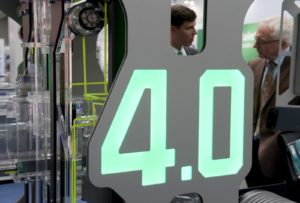 There’s no doubt about it, Hannover Fair is an enormous industrial trade show—often said to be the world’s largest. It’s a must-attend event for many companies every year, but for the fluid power industry, the odd-numbered years are especially important. In those years, the Fair includes a particular focus on fluid power and motion control components and systems—and that’s what’s in store next April 24-28.
There’s no doubt about it, Hannover Fair is an enormous industrial trade show—often said to be the world’s largest. It’s a must-attend event for many companies every year, but for the fluid power industry, the odd-numbered years are especially important. In those years, the Fair includes a particular focus on fluid power and motion control components and systems—and that’s what’s in store next April 24-28.
The Fair also feature a different theme each year. For 2017, the theme has been chosen as “Integrated Industry—Creating Value.”
“Widespread uptake of digitalization in the manufacturing and energy industries will only happen if integrated technology providers make a strong case for the associated benefits,” said Deutsche Messe Managing Board member Dr. Jochen Köckler. “Manufacturers and energy companies need to fully understand the direct, long-term benefits they stand to gain from digitalization. They need to recognize that digitalization adds value—and not just in terms of new and better machines. Value is also created by the ability that digitalization gives companies to update or completely reinvent their business models and improve the working lives of individual employees.”
With Industry 4.0, integrated energy, digital twins, predictive maintenance, digital energy, and networked and collaborative robots (cobots), companies of all sizes today have a multitude of high-tech solutions to choose from. But often they find it difficult to predict what value these sorts of solutions might add. Many understandably balk at committing to major capital investments without concrete prospects of measurable benefits.
Next year, the show will demonstrate how even companies with limited resources can pinpoint and harness the power of digitalization. According to Köckler, “Industry 4.0 is not about replacing all manufacturing plant all at once; it is a gradual process. For example, companies can begin by fitting sophisticated sensors to existing plant to capture and evaluate data that will help them make improvements to their production processes or develop new business models.”
Next year’s Hannover Fair will provide much-needed guidance to visitors from the manufacturing industries who are looking to leverage the benefits of digitalization for their companies and transform their plants into Industry 4.0 factories, step by step.
Digitalization will completely transform the energy industry, too. In fact, it is the key to the energy transition most countries are striving towards. In the energy systems of the future, smart grids will control and regulate all parts of the energy supply chain, from generation right through to consumption. Without digitalization, it will not be possible to make the switch from today’s outmoded centralized power plants to modern, highly efficient energy systems that are based on renewables and distributed generation structures.
And Integrated Industry will reach far beyond the walls of smart factories. The goods produced by smart factories will stay connected with their manufacturers throughout their service lives, supplying a constant stream of valuable data. This data will enable the manufacturers to develop additional web-based services and to pursue new business opportunities outside the confines of their traditional industries. In the energy industry, for instance, “prosumers” and virtual power stations are prime examples of opportunities that were opened up by digitalization in the form of distributed generation systems.


Leave a Reply